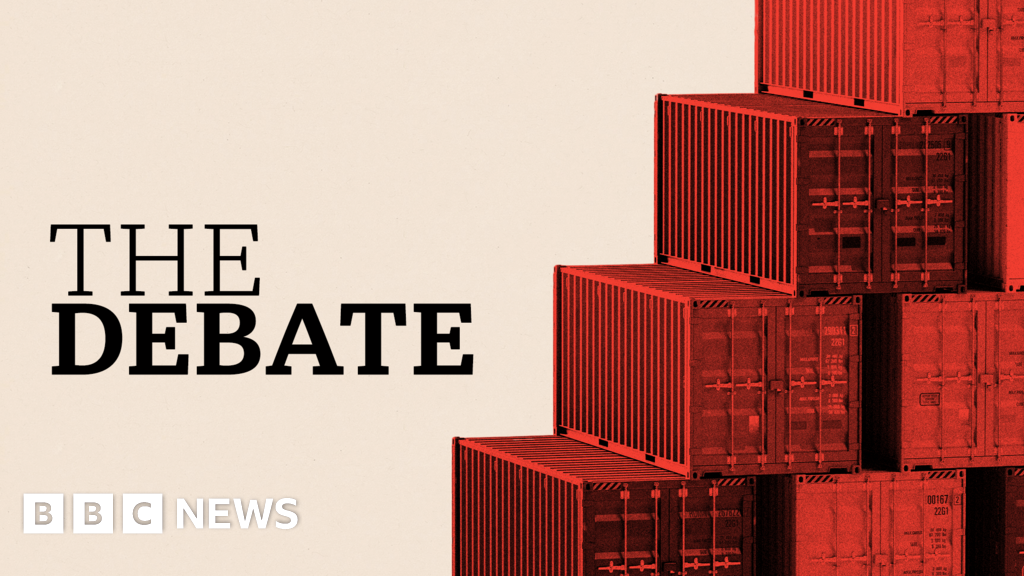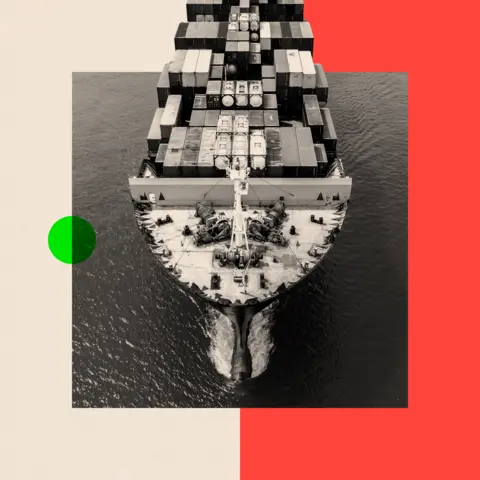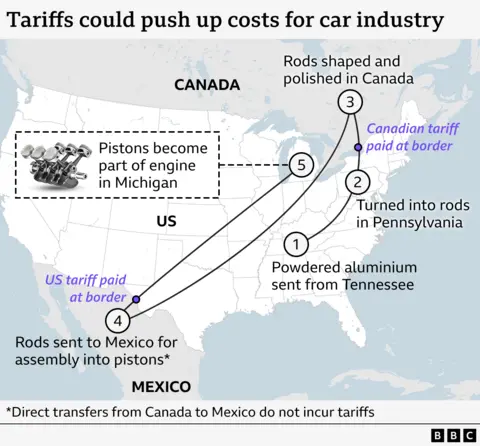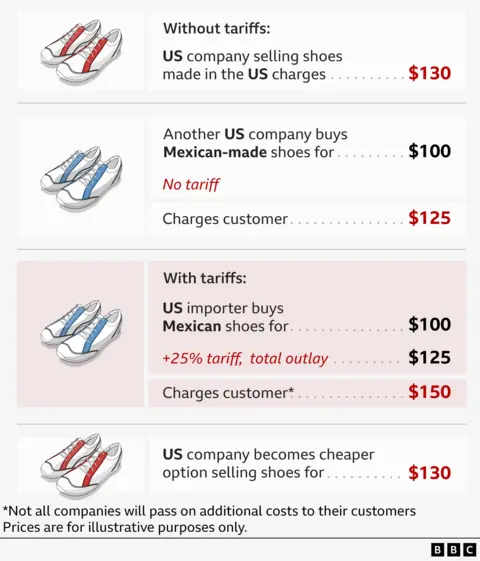Physical Address
304 North Cardinal St.
Dorchester Center, MA 02124
Physical Address
304 North Cardinal St.
Dorchester Center, MA 02124


Great Economy Correspondence
 BBC
BBCPresident Trump’s sweeping tariffs aim to protect American industries and collect funds – as we have seen – are used as a bargaining drug.
The Republican has already imposed a tariff on Imports from ChinaDeclared plans for Service 25 % on all imports of steel and aluminumAnd threaten to reach 25 % tariffs for Canada and Mexico. We do not yet know to what extent will go, but if what is already present on the table passes, the average definitions will raise its highest levels since the 1940s, indicating a new chapter for global trade.
Since the end of World War II in 1945, the customs tariff has been widely seen as leading to high prices of consumers, and less choice – amid inevitable revenge – after he was supposed to protect it. But do we manage our backs in this era?
It has hosted a discussion with economic experts in the commercial policy of hacking the effects of Trump’s policies on America and the world, and exploring different views about among us may be the largest winners or losers.

Meridith Crole Professor of Economics at Cambridge University. It believes that the customs tariff can lead to a much heavier economic burden on the lowest income.
Jeff Ferry He is the chief economist in the prosperous coalition of America. He believes that definitions can lead to growth and rebuild the American industrial industry.
Dhashini David (DD): President Trump described customs duties as “the most beautiful word in the dictionary” – which is really interesting. What is gravity for him?
Jeff Ferry (JF): I think Trump is completely clearer that he believes that customs tariffs are a “beautiful” thing for several reasons.
First, because they can revive and rebuild the American industrial industry. He also believes that the United States is running a major commercial deficit. In 2024, we had a record deficit in the merchandise trade of $ 1.2 trillion, which means that the rest of the world, especially the circulating countries, generates large quantities of revenues by selling to the American market. This gives the United States a strong negotiation tool and we have seen its use, with regard to drugs and immigration with Canada and Mexico in the past few days.
Meridith Crole (MC): Virtual is that what provokes Trump’s interest is the low manufacturing functions within the United States over the past forty years.
He noted that many of the jobs that were present in the United States have migrated to other countries of low wages such as Mexico and China and I think his hope would be that by imposing a tariff that can stimulate the creation of jobs.
DD: We know that countries are considering reprisals as well. To what extent will these measures affect Trump’s economic goals?
JfThere is no doubt frankly that was easy by traditional American standards.
500 years of history explains that the economy profession, in its short -term obsession, has damaged only the American workers and the American people, but in reality, for the British people and British workers – and workers in many countries.

DD: In the post -war era, we saw the demolition of commercial barriers and the idea that globalization was good. Do we now see a violent reaction against this?
JfWe are witnessing a historical shift away from the consensus of the post -Second World War, which arose from the period when America was ahead of the rest of the world – and America was very concerned about the communist threat.
So what you call “free trade”, and I would like to call Breton Woods The consensus of the fixed exchange rate of America is designed to support and even support the growth of European economies and other economies.
We have now moved to a new stage where it is known that the American economy has begun to stumble in the seventies, and China has risen to become the first manufacturing power in the world mainly by exploiting all rules in the system.
We need a new system.
McI have a different diagnosis of what happened in modern history.
Over the past forty years, it is clear that more protection is very popular. Between 1981 and 1994, car imported car imports from Japan, which were eventually raised.
One, raising the price of cars to Americans. Second, in the long run, it has led to the investment by Japanese manufacturers in the United States, and today, the United States has a vibrant cars. You can directly support the American industry by obtaining direct government support.

Trump has now created uncertainty that Canadian manufacturers will be able to reach the United States market in the future. Because Trump has achieved his threats in 2018 to impose a tariff on China, major companies may review plans to expand operations in Canada or Mexico to serve the American market. There will be a decline in real economic activity in these trading partners.
DDMeridith, Trump acknowledged that there may be little pain for Americans in the short term because as I mentioned, the definitions tend to rise in prices.
McA study on what happened in the first round of Trump’s tariff in China in 2018, in the first two years, showed that most of the costs were absorbed by importers and distributors and were not transferred to consumers. The price increases though, tends to come gradually.
Once you realize that the customs tariff is permanently present, the manufacturer realizes that everyone should pay it and raise its prices gradually.

One of the concerns that economists possess is the people who buy a lot of commodities rather than services tend to be low -income. Therefore, when you put a tariff on things like children’s coaches, backpacks and clothes, these types of consumption elements and private education for children.

DDJeff, are you concerned about a global trade war that can bring in reverse results on Trump’s goals?
Jf: We have been in a trade war since 2001, since China entered the global trading community. Long -term trade war. Now America takes measures, and many people throw their hands, not because they are concerned about a commercial war, but because they are concerned that they may lose a valuable market for their own products.
But I want to return to consumer prices.
People focus purely on negativity. The purpose of customs tariffs is to stimulate the local industry, so on the positive side, you can create new investments in the local industry. On the negative side you get an increase in prices. Therefore, it depends on the numbers in both cases.

What we know from the first round of the Trump tariff, between 2018 and 2019, is the high price of identification goods, such as steel, but companies committed to building new factories such as steel factories that rented several hundred people – the functions of people with great blue collars for people who do not get University degree.
The current stage of globalization that started around 1990 was just a big mistake. The idea that the United States could compete with Mexico for salaries, especially for manufacturing workers, crazy.
DD: Let’s get a Meridith offer on this topic. Do you agree that with regard to high wages economics, globalization has not been a great idea since the 1990s?
Mc: I understand Jeff Point, that the only concern of the president should be the welfare of the Americans. However, between 1990 and 2023, the number of people around the world who lived in extreme poverty decreased by less than $ 2.15 (1.75 pounds) per day from one billion to about 700 million. More than a billion people come out of poverty due to an increase in globalization is an amazing achievement of humanity.
It is quite clear to everyone that in American society, the benefits of globalization were not equal, and therefore there is a real need within the United States to think about how to improve the welfare of the least skilled people, and how we get jobs in the economy to help them.
Where he disagreed with Trump, I think there are more effective tools. You need an industrial policy or production subsidies. American productivity is very high because we are constantly investing in employment provision technology, but the result is that the least skill left behind and that their lives are worse than they were thirty years ago.
JfI agree to a hundred percent with Merridhyth.

DD: This is amazing. If we see the type of commercial barriers that Trump wants to put in place, what does this mean for this issue of equality?
Mc: Once you start setting barriers between countries, you create a lot of opportunities for what we call in the world of economics monopoly profits. Once the entry is reduced, the current producers get their prices and exploit consumers.
If the United States enters a trade war with China, what will happen to imports from countries that the United States does not care about its trade war?
If the United States and China deepened their trade war, this may affect the participation of the supply chain in sub -Saharan African countries with the United States and China, which means it will be one of the world’s areas that bear some of the weight of this trade war.
So the indirect effects can be very negative.
DDJeff, is this a price worth paying? What kind of effect can we see on growth?
Jf: I do not think about the matter as a price worth paying, I think about it as a development of the world system as we hope we will get higher growth everywhere. This is where I disagree with the prevailing view of the economy, which focuses a lot on trade and simple productivity gains.
The world grew through the success of industries. American prosperity from 1900 to 1970 was largely due to the auto industry. What I saw was huge production gains, as Henry Ford and all his successors were invented and the development of massive production. I have seen wage increases and increased spending and we had the most prosperous economy in the world.
So what we need is industrial growth and when you look at the framework of national security, we cannot rely on China on the largest number of goods as we are today. We rely a lot on China here in the United States, Europe depends a lot on China. So what is the decision? Well, the decision is very clear – we need to form some goods here in the United States.
Produced by: Rosemary Makap
The highest credit photo: Getty Emus
This text has been released for clarity and brevity.
BBC It is the home on the site and the application to get the best analysis, with new views that challenge the assumptions and deep reports on the biggest issues of the day. We offer a thinking content from all over BBC Sounds and IPlayer as well. You can send us your notes in the INDTH section by clicking the button below.